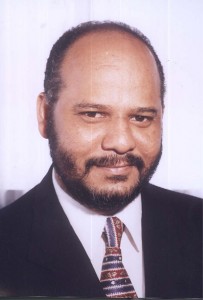Home Affairs Minister Clement Rohee says he has nothing to say over the report that equipment reportedly used by drug-indicted businessman Roger Khan to intercept calls was re-exported to the US in 2007, since he only read about it in the newspaper and has “not thought” about it.

Rohee was last week asked for a comment on a report in Stabroek News that the controversial equipment, which was seized from Khan and others several years ago, was shipped back to the US by Khan’s former lawyer Robert Simels. Probed as to whether he was concerned that after the equipment was seized by law enforcement officers it was then apparently handed back to Khan, the minister still maintained that he had nothing to say on the issue.
According to court papers seen by Stabroek News, the specialised telephonic equipment allegedly used by Khan was among the items seized from the New York office of Simels during an investigation. Simels is now facing witness tampering charges in the US. Questions had been raised as to what had happened to the equipment, which had been discovered in 2002 in a vehicle Khan and others were in by members of the Guyana Defence Force’s (GDF) Intelligence Unit. It has since been alleged that Khan used the equipment to improperly wiretap the calls of various high-ranking officials and others within Guyana in order to maintain his operations.
Secretary of the Defence Board, Dr Roger Luncheon had maintained that he had no idea where the equipment was.
Last Thursday PNCR leader Robert Corbin expressed concern about how the surveillance equipment, ended up in the possession of the businessman’s lawyer in New York.
Corbin recalled that the device had been the subject of much comment by both the local media and the PNCR and he questioned how it ended up in the U.S. He said he thought that either the security forces had taken charge of the equipment or that it was in the possession of a government official. “Did they facilitate this laptop going to aid Roger Khan?” he asked.
In an affidavit in support of a search warrant executed on Simels’ office, Drug Enforcement Admin-istration (DEA) officer Cassandra Jackson said the equipment was shipped by the lawyer to his York Avenue, New York office. She said Simels had planned to use conversations recorded on the equipment during Khan’s trial.
Jackson said the information about the equipment was gleaned during recorded conversations between Simels and the US government’s confidential source some months before Simels, his assistant, Arianne Irving and Khan were hauled before the court on witness tampering charges arising out of Khan’s indictment on conspiracy to import cocaine into the US. The government’s source informed the DEA that prior to his arrest Khan used a computer while in Guyana to surreptitiously record telephone conversations of individuals. Jackson said she believed the conversations referred to by Simels were captured using Khan’s eavesdropping equipment that was in his possession. Records maintained by the Department of Homeland Security’s, Bureau of Customs and Border Protection, show that on or about October 11, 2007, prior to the disclosure of the recorded conversations, equipment identified as a ‘Portable Auto Data Processing Machine’ was shipped from Guyana to Simels.
This would have meant that it was returned to Khan after he had been acquitted on gun charges stemming from the 2002 interception. Jackson said the records also indicated that from October 9, 2007 to October 12, 2007, Simels was in Guyana and that during one of the recorded conversations with the source had confirmed he had the equipment.
The US government was subsequently granted permission to seize the equipment and other computers and material from Simels’ office following his arrest and the information is now being sifted through by court-appointed persons.
Last year Simels had said that Khan had received permission from the Guyana government to purchase the equipment from the Spy Shop in Fort Lauderdale, Florida. However, this was subsequently denied by Dr Luncheon. Equipment of this sort is usually only exported on a government to government basis.
In a subpoena to the DEA, dated April 28, 2008, Simels stated that following Khan’s arrest, “FBI agent Justin Krider investigated Khan’s purchase of the computer telephonic surveillance equipment from the Spy Shop in Fort Lauderdale, Florida and found Khan had permission from the Government of Guyana to purchase and possess this equipment.” Simels at the time was seeking the testimony and all documents in Krider’s possession as these relate to the surveillance equipment purchased in Florida.
Responding to the allegations of granting permission to Khan, Dr Luncheon while admitting that his government did business with Khan denied he ever signed any document authorising him to import the equipment or colluded with him.





